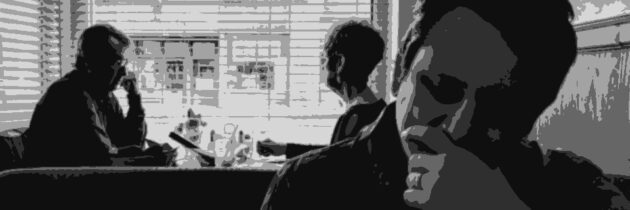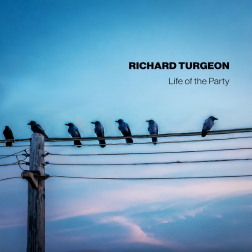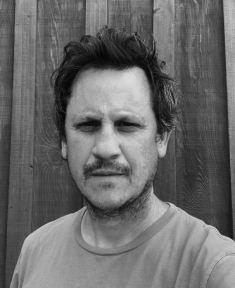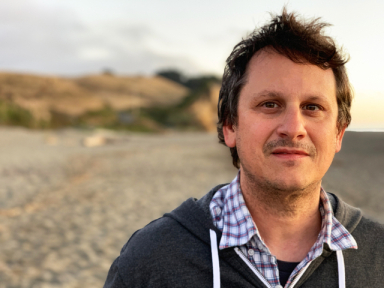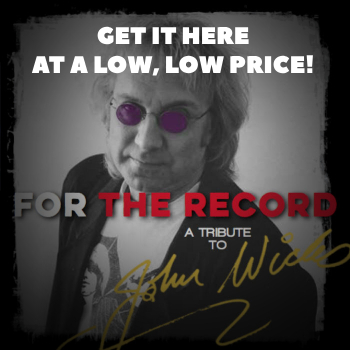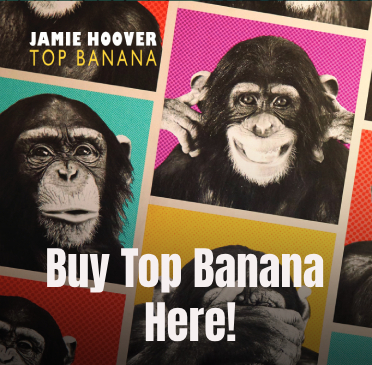Richard Turgeon Talks Life of the Party & More
In 2017, Richard Turgeon captured the imagination of this power pop enthusiast with “Bigfoot’s an Alien”. It’s dynamic guitars, unorthodox subject matter, and catchy chorus made it an immediate favorite. Since then, Richard’s albums have appeared regularly on our year end “best of” lists. Past titles on said lists include: In-between the Spaces (2017), Los Angeles (2018), Go Deep (2019), Sea Change (2020) and Rough Around the Edges (2022). While each album explores some new territory, there is a common thread throughout his work. All feature extremely well written songs, distinctive guitars and catchy choruses.
That takes us to the present time and 2023’s Life of the Party. It’s yet another outstanding release and a great excuse to speak to Richard about this and past releases, his processes, motivations and future plans. It’s one of the most interesting discussions I’ve had in a long time. So here goes…
How do you approach songwriting? Do you wait for ideas to strike you or do you approach it as if it were a job – sit down at the piano and write songs from 9 to 5? Where do you find inspiration?
I write regularly and have been writing songs since my early 20s, and I think that consistency over the years (especially the last six or so) has helped me make it something I can do on-demand when I need or want to, versus waiting for inspiration to strike. I do take a very workman-like approach to my songs, which also lends to that consistency and honing of craft. I’m not a rock star or whatever, but I take it seriously and have a professional mindset for sure. I always want to do my best and meet professional standards in terms of the song and the recording.
As far as the process goes, sometimes it starts with a guitar riff, or I hear something in my head on a jog or when I’m supposed to be paying attention to life. From there, I keep noodling on it, building parts on my electric guitar (unplugged when I write), then lyrics come last. Lyrics need to reflect the vibe of the music and vice versa, and I start with a metaphor or idea to build on, or story to tell. I always write lyrics digitally on Apple Notes or something like that, since I type way faster than I can write by hand, and it’s conducive to noodling quickly.
I rarely walk around life and say, “Ah ha! That inspires me to write a song.” For me it’s more about what I’m feeling or what I care about at any given time—then I write a song to express that. I write about relationships, memories, and sometimes weird niche topics like Keanu Reeves, Bigfoot, childhood fire drills and such, so my songs are just a creative way of my playing back what’s happening or interesting to me about life.
If I were to thumb through your record collection, what titles would surprise me?
Richard: Oh boy. Probably pop metal stuff I treasure like Motley Crue’s early stuff, or Def Leppard’s Pyromania and Hysteria, which I have unironically loved since my early teens, and still do. I am a sucker for big-sounding, hooky ‘80s pop rock and pop metal. Yes, Heart, Journey, Men at Work, Night Ranger, Poison, Ratt… that kind of stuff.
Other surprises might include Hall and Oates greatest hits. The Cure’s records, up to Disintegration. The Spin Doctors, the Red Hot Chili Peppers (Californication in particular), and the occasional Taylor Swift. I also love John Coltrane and ambient music in general.
If memory serves, you not only write all the compositions on your albums but play every instrument. It’s truly a one man show. This gives you complete creative control. Is this for commercial or artistic reasons? Or another entirely?
That’s a very interesting question, and there are a lot of layers to it.
I think I wear all of those hats because I can. If I couldn’t get the sounds I wanted as a producer, mixer, guitarist, drummer, and vocalist, I would be more of a band guy. Same with songwriting. If I felt incomplete or inadequate in some respect, I’d be more of a collaborator or co-writer guy. It’s not about ego with me, or that it’s because I think I’m great at everything. But I have worked really hard to develop these skills and build on them over time to be able to put out records myself. So it’s really about having that sonic “vision” and being able to translate that to the recording. I do like that level of creative control.
Commercially, of course it helps to avoid credit hassles and all that. That’s not really a concern with an indie guy like me from a financial standpoint, but I did set out to be a songwriter in my early 20s because I am a writer, I wanted to express myself that way, and I knew that publishing would be the best way to ever make a living at it. I haven’t gotten there, but I’m glad I do what I do now as a solo artist—it gives me ownership and empowers me to create the music I want to hear.
All that said, I want to give a shout-out to my longtime musical collaborator, Ron Guensche, who plays bass on a lot of my tracks, because he’s way better than I am. He also listens to practically all of my mixes before they’re deemed final. I also produced, wrote lyrics for, and performed on a song co-written by my current live bandmate, Eric Salk. I also have a go-to guy for keys once in a while, Tommy Carmine. So while I’m a solo artist, I’m fortunate enough to have found this crew of talented collaborators when needed.
My favorite songs of yours are the ones that defy the norm. There’s “The Squirrel” and “I Wanna Be a Shut In” from 2018’s Los Angeles. There’s “Bigfoot’s An Alien” from In Between the Spaces or “Lonely Old Man” from Go Deep just to name a few. All of these are not only musically engaging but lyrically outside the box. What are your favorites and why?
Thanks, I appreciate that. I am aware I come up with some quirky stuff here and there. It’s not by design; I think it’s that comedic, neurotic, somewhat dorky side of me coming out in my songs. Sometimes I try to resist songs like that because there’s this part of me that thinks they’ll be taken as comedy rock or something more lowbrow than my more “literary” kind of stuff, but I try to be true to myself.
As far as my favorites, I tried to put those on my greatest would-be hits record, The California Collection. From that, I really like “Sunset,” “Lost Angeles,” “Next to Me,” and “Never Leaving California.” Also “Goodbye to Summer,” which is why I chose to shoot a video for that in LA. I’ve gotten more fond of “Keanu Reeves” over time, too, because it’s tongue-in-cheek but honest and earnest at the same time.
There are more favorites, but that’s a good start. I like to perform all of those live, which is kind of a good litmus. There are songs I don’t love so much anymore, or that I wouldn’t write or release, but I feel like I started getting more disciplined about putting together more cohesive records and found my style more starting with Campfire Songs. I have a soft spot for that EP for a number of reasons. Mostly I’m just really proud of those first three songs in particular.
That brings us to your latest, Life of the Party. I’ve always loved your guitar work. That said, I was especially moved by “Don’t Forget Me When You’re Gone”, a piano driven tune. It’s one of my all-time favorites of yours. Can you share a little bit about the song with us?
Thanks, Rich, I really appreciate that. I’m not what I’d call a technical, fast, or flashy player, but I like to think I’ve developed a certain sound and style of playing over the years.
Regarding “Don’t Forget Me,” that started as that downward progression of notes in my head, and I knew the main instrument or “riff” had to be on piano. It needed to be written on piano, like “Hey Jude” or “Imagine.” Thing is, while I record basic keys on some of my stuff, I am not a piano player. So I wrote and recorded the piano kind of one hand, one piece at a time, by ear, and built the recording on that. When I recorded drums for it, I only had one note at a time on guitar. No lyrics. No chords, no piano. Not my usual process, but somehow it worked and all came together.
I wrote that one for my father, who has Parkison’s disease. He’s doing fine, but the song sounded like that feeling of someone you love that you don’t want to lose—whether it’s to old age, or a breakup, or anything else. My wife has heard pretty much all of my songs over the years and she thinks it’s the best thing I’ve ever done. It’s definitely one of my more ambitious songs and productions.
I took my time on it to honor my dad and make him happy, and of course meet my own high standards. He and my mom cried when they heard it, and that oddly makes me really proud. You always want your music to connect on that level with listeners, whether you know them or not.
You’ve worn quite a few hats – that of a screenwriter, illustrator, director and of course, musician. And you’ve got 6 well received albums to your credit. Is there a moment, a song or album that you’re most proud of?
Actually, five albums, two EPs, and two collections of covers since 2017. All on Bandcamp and streaming outlets, by the way (<not so shameless plug).
I’m proud of the body of work since 2017’s In Between the Spaces, when I started getting active with my music again, and decided to just start focusing on my solo recordings, and producing and performing my own stuff. If I had to pick one single record or song, it would be “Goodbye to Summer” from Campfire Songs, and that EP in general. I can get behind any of my records, but like I said, I have a bit of a soft spot for where I was in life when I worked on that record, and I think it comes out in the music.
I am really proud of being played on Rodney Bingenheimer’s show on SiriusXM several times, because he is one of the coolest DJs on the planet and always will be. And I was thrilled to have my song “Higher” featured at the end credits of my friends’ documentary about women in sports.
Last but not least, I optioned my first screenplay a few years ago, Holy Man, about Dennis Wilson’s time with Charles Manson and the Family. The last six years or so have been full of highlights and I have a lot to be grateful for in my creative life—including longtime supporters like you, listeners, and my live band I’m playing with now.
What’s next?
Life of the Party is probably my best record yet, and it won’t be my last. But after all the activity these last 6-7 years, I just need to slow down a bit to focus on some other things like family, paying the bills, playing live, reading more books, writing more, hiking and road trips, doing things just for fun. Maybe getting back into scuba diving.
I’ll still be making records, but not a song-a-month kind of pace like I have been for a while. It’s a good thing, because I’ll have more gas in the tank for when I’m ready to work at that pace again.
As far as what’s next, I’ve been working on a screenplay about Bigfoot for the last two years. Even before Life of the Party was completed, I’d cooled off on recording to focus on getting this script ready for prime time in the spring. Some of my goals have always been to sell a screenplay and see it on the big screen. Getting a novel published. So 2024 I plan to put more focus on my writing, and secondarily working to get my songs in TV and film soundtracks, which has also always been a goal since I’m really a recording artist first and foremost.
Thanks for this interview, Rich, it’s been great…
Thanks for the opportunity, Rich. I’ve always felt like you got my music with your reviews and I am really grateful for the chat and your support over the years.
Get Richard Turgeon’s Life of the Party
Richard Turgeon’s latest, Life of the Party, is available digitally through his Bandcamp page. Should you prefer physical product, the CD will be available through Kool Kat Musik on February 2, 2024. Take my word for it. You don’t wanna miss it.
Looking for past releases? You can get any of Richard Turgeon’s prior albums, all very much worthwhile, by visiting his website HERE.

